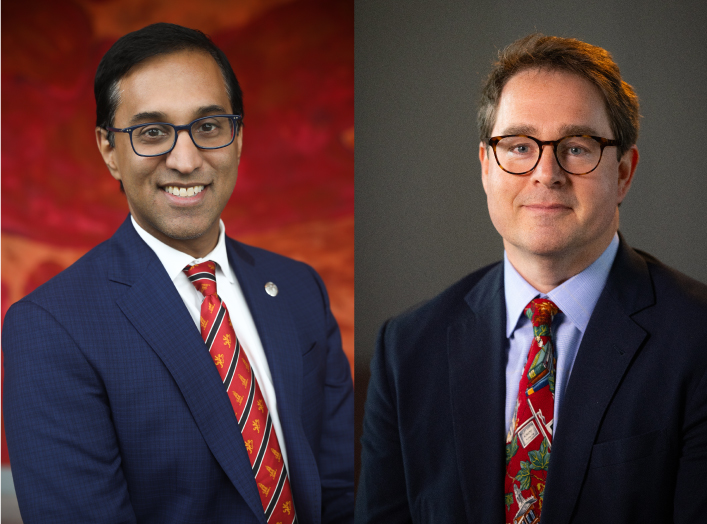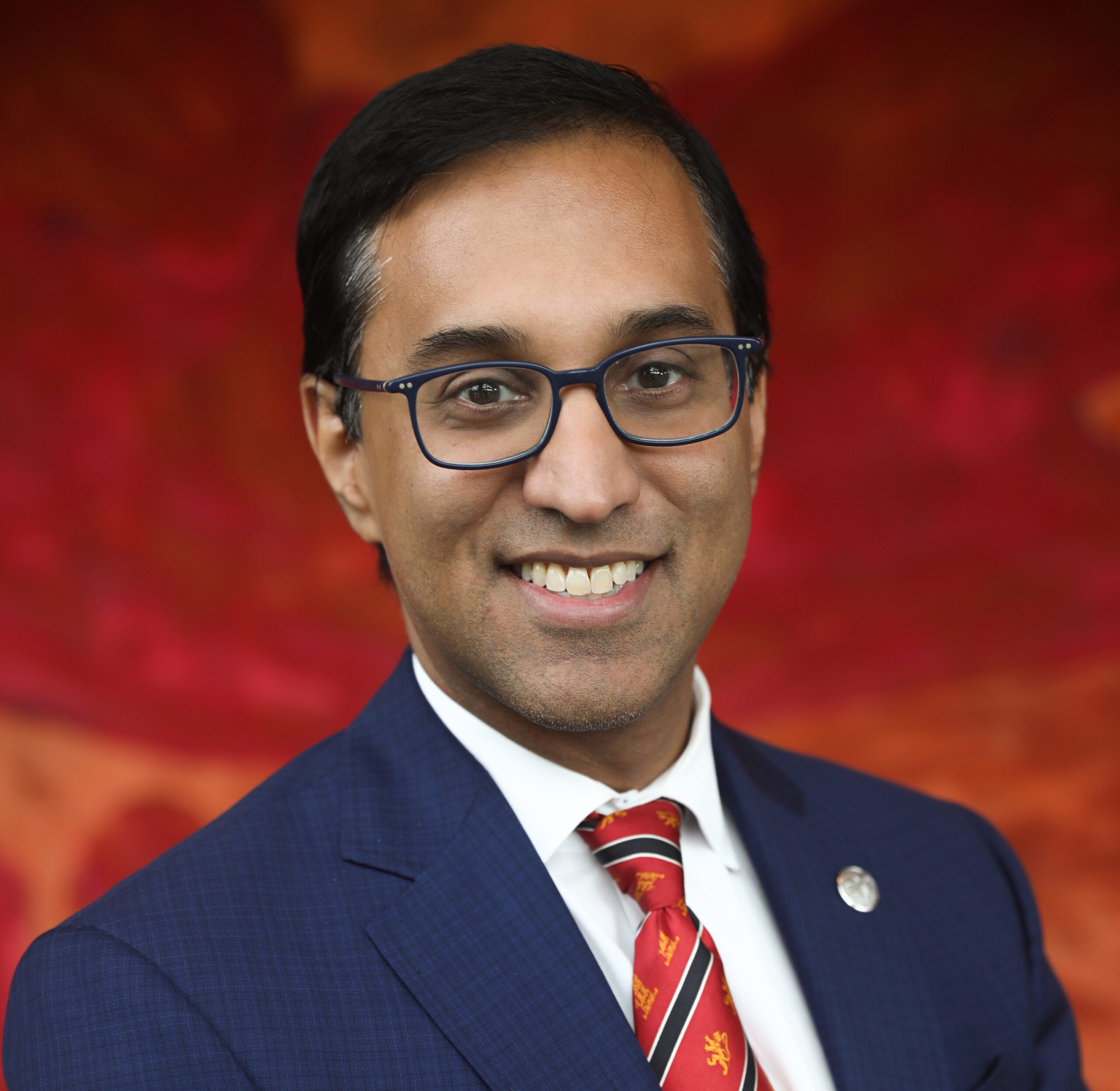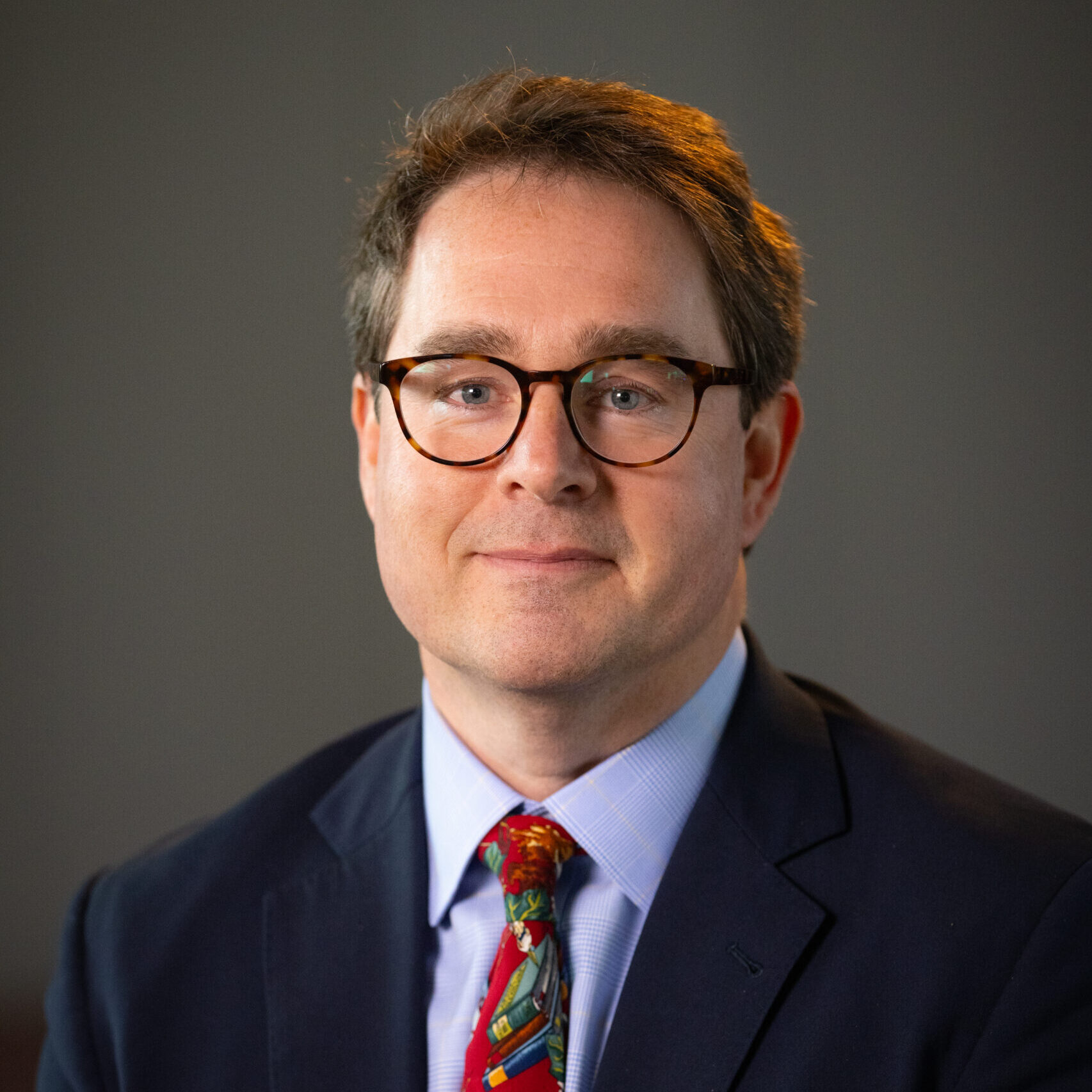Trustees Talk: The future is now

Classmates and trustees Dr. Sanjay Shetty ’92 and Sam Brown ’92 discuss the fall Trustee meeting, being an Exonian and whether a hot dog is technically a sandwich.
 Dr. Sanjay Shetty ’92; P’23 is in his fifth year as an Exeter trustee. He is president of CenterWell, Humana’s health care delivery and services segment, overseeing its national primary care, home health, pharmacy and military business.
Dr. Sanjay Shetty ’92; P’23 is in his fifth year as an Exeter trustee. He is president of CenterWell, Humana’s health care delivery and services segment, overseeing its national primary care, home health, pharmacy and military business.
 Sam Brown ’92 is president of the General Alumni Association and is serving his first term as an Exeter trustee. He oversees film and TV production and development as president of STX Entertainment.
Sam Brown ’92 is president of the General Alumni Association and is serving his first term as an Exeter trustee. He oversees film and TV production and development as president of STX Entertainment.
Watch the full conversation between Dr. Sanjay Shetty ’92 and Sam Brown ’92 or read the Q&A below.
Sanjay Shetty: What inspired you to serve in the leadership of the General Alumni Association (GAA) and now as a trustee?
Sam Brown: I think it was eight years ago that I was discussing with somebody in IA, which is, I learned, not Internal Affairs, but Institutional Advancement, and was expressing my desire to be more involved in the Academy. They pointed to the General Alumni Association. I went through the process and joined the GAA board. I have since learned that the entire alumni body, all of the almost 20,000 alumni of Exeter, are automatically part of the GAA. Then there are about 20-plus board members who serve as facilitators of information from the alumni body to the Academy, and from the Academy to the alumni body. I became a very active and enthusiastic member of the GAA board leading up to being elected as the president over the summer. The way that the governance is structured, that role automatically becomes a trustee ex officio. But really, all of it stems from the fact that I had an incredible time at Exeter. Exeter shaped me into the person I am today. And ever since I left Exeter I’ve been looking for ways to repay Exeter.
What drew you to get involved as a trustee?
Shetty: Similar story. When I look back at Exeter, it really changed my life. I think about what I was like before, and what I was like during and after. It really changed how I thought about myself. I think it was at our 10-year class reunion, where I got pulled into being a class correspondent. I was a class correspondent for 10 years with Shane Kramer ’92, and then class vice president and then class president. That led to me being approached to serve as a trustee. The commitment is a lot larger as a trustee, but it’s been amazing. I feel like it pays itself back.
You recently attended your first Trustee meeting. From your perspective, as the new guy, tell us about the meeting. What did you do?
Brown: The meeting was in October. The weather was spectacular — perfect fall days — and the campus was vibrant. As a new trustee, there was an extra day of meetings, so I had a full day of meetings on Wednesday — starting at 8, not 8:05, but 8 o’clock Wednesday morning and going all the way through to post dinner Wednesday night. And that’s repeated Thursday and Friday. It is a lot.
The other thing I’ll point out is, and I was warned going in, there is a lot of reading. It’s not surprising that there is a lot that goes into preparing for these meetings, so you can come ready to engage.
It was exactly like being a student at Exeter. You’re on campus, and you’re around a supersize Harkness table because it has to accommodate 20 to 25 people. It’s like the Hulk of Harkness tables. It’s like 10 pieces of table that are pieced together to make one giant Harkness table. It’s a feat of woodcrafting.
I had a bunch of reading that I left to the last minute. I had to race to make sure I was there on time because it was really not OK for the new guy to be late and hold everything up. You were in these meetings through an entire day, past dinner. Yet coming out of it, I wasn’t exhausted. I was invigorated. All of it is completely engaging and the people are incredible. Ultimately, my headline impression was just how much it brought me back to being an Exonian student.
Shetty: I’m glad you mentioned the big Harkness table. That was truly surprising to me when we got there because it actually puts everyone in that frame of mind of when we were students, like you are there to participate. You are there to listen. The expectation of each of the trustees is that you are engaging in the conversation and have input in whatever we’re talking about, and you will get called out if you are too quiet.
One of the things I’m sure people are wondering about is: What were the big topics on the agenda for the discussion? What seem to be the most pressing decisions for the trustees in the coming year? In the coming five years?
 Brown: I’ll speak about the things that stuck with me as topics of investigation. And I would point out that the Trustees are not having these conversations in a vacuum. There are discussions that are just Trustee only discussions, but those are, from what I just experienced, much more the exception than the rule. Principal Rawson is in most of these conversations as are representatives of the key departments within the Exeter community, and many of the discussions are based on presentations of these various department heads and representatives of the various aspects of the community.
Brown: I’ll speak about the things that stuck with me as topics of investigation. And I would point out that the Trustees are not having these conversations in a vacuum. There are discussions that are just Trustee only discussions, but those are, from what I just experienced, much more the exception than the rule. Principal Rawson is in most of these conversations as are representatives of the key departments within the Exeter community, and many of the discussions are based on presentations of these various department heads and representatives of the various aspects of the community.
One area of ongoing consideration is balance. How does the school continue to challenge some of the most high-achieving students on the planet in a way that acknowledges and balances the stresses and rigors of those challenges? It is not a topic that is unique to Exeter. But that is an area of ongoing debate.
There were some interesting conversations around how to honor students’ desire to become extremely pointed in certain areas. How is Exeter allowing for those students to pursue specialized interests, while at the same time acknowledging that part of what distinguishes Exeter as a school that is preparing kids to be leaders within society and humanity, is the need for balance in life. How does the school acknowledge and allow for both specialization and balance?
Another important ongoing conversation is around attracting and maintaining the best faculty and staff. The Academy, I think appropriately and rightly, aspires to the most diverse faculty and staff. How do we do that when Exeter is not in an incredibly diverse part of the world? How does the school do a better job of marketing itself to those potential job applicants?
And how are we honoring the students’ and, to a certain degree, their families’ expectations that Exeter is setting them up to succeed? How do we define success? And how are we defining success when it comes to college admissions in an environment that is becoming more and more competitive?
Those are certainly not the entirety of the topics discussed, but they are representative of the kinds of topics and issues that were discussed.
Shetty: I think a lot of people also don’t realize that the Trustees are the fiduciaries for the school. We’re charged with overseeing the school over the long haul, inheriting the responsibilities of the Deed of Gift from back in 1781. A lot of those questions you just talked about are very much strategic. My daughter has asked me, only half joking, “What are the Trustees going to do about lunch in Elm Street?” That’s not what we’re doing. We don’t get involved in the day-to-day operations. We select a principal and the principal is charged with running the school. Our job is to help develop and manage the long-term strategy. And that’s what focuses a lot of our conversation.

Long-term financial sustainability is one area of focus. Some might say that our resources are infinite — what do we have to be worried about given our large endowment? But the reality is that the world is changing around us. How can we continue to support our core mission, ensuring that Exeter is a school that’s available to youth from every quarter? I think the Trustees really take that responsibility very seriously. Our job is to look around the corner, think far ahead. That’s what makes it so interesting for me because I never really thought of Exeter that way. Exeter, for me, was the three years that I was there and then a reunion every so often. But the fact is, it’s this living, breathing institution that continues to evolve. It’s really cool that we get to play even a small part in helping develop that strategy, with a hope that the school will end up a better place because of what we did.
Brown: I can’t say enough how impressive the Academy looked through the prism of the Trustee meeting. Just how intentional trusteeship is. It is not a preference that people attend the meetings in person, it is a requirement. That’s a big commitment for anyone. By having everyone there in person, engaged and focused during those conversations, it leads to a level of thoughtfulness and stewardship that I haven’t seen in other boards that I have participated in. I know that that’s a result of the Trustees and the governance that came before me.
Shetty: I’ve had a chance to serve on Governance and Nominations, which is the committee that helps manage that process. The main criteria for people that we’re bringing onto the board is that we’re looking for that diversity of perspectives and expertise. It’s amazing what can happen when you put all these different voices around the table. We get to a better answer because of it. And we keep it intentionally small. At about 20 people, it’s a very meaningfully chosen set of alumni at the table that allows for robust conversations. And, like you said, it’s a really big commitment. People find a way, no matter what their day job is, to make it happen. And it all, I think, stems from that love for the Academy.
Brown: Absolutely. It is an engaged and empowered board. It is not performative. It’s not a group of people that are there just because they’re able to make large donations. It is stewardship and leadership. That was what was really exciting for me as a new trustee.
Shetty: This is more of a fun question because you’re in the film industry. If you were to do a movie about the Trustee meeting, whom would you cast as Principal Rawson?
Brown: Easy. Robert Redford. He’s both thoughtful and strong, but also deeply caring, which are elements of Principal Rawson. His leadership has been very impressive to me, both as an alum, as a member of the GAA board, and now, as a trustee.
This conversation was first published in the winter 2025 issue of The Exeter Bulletin.d